For my first original article at Eternal Titans, I wanted to discuss a very tricky and controversial topic from card games: bluffing. Bluffing is not a huge part of Eternal. In general, we just try to win by playing better decks and making smart exchanges of resources during games, you can get to the top without ever doing it. The idea of getting ahead by tricking your opponent that you have a card that you don't have always comes as an afterthought, something possible but not necessary to win. This was my original view. I drafted a lot of Magic: the Gathering and it never seemed to be relevant. Eternal, however, lends itself more to bluffing, as combat tricks are more common and there are a lot of low rarity units that are highly valued (such as Awakened Student). The pause system also incentivises you to wait and gain information, so the right situation appears more frequently than in Magic. The right situation is the key element about bluffing, picking the correct spots to trick your opponent is the main deciding factor towards its success.
Throughout this article, I will discuss a very basic scenario: your opponent has one unit that can block this turn which is bigger than the unit you can attack with. There is a misconception that certain players always call for bluffs and others always fold to them, that is not true, as people will react according to the in-game circumstances and often it will be easy to predict their behaviour. Good players are good because they adapt to the situation, read your hand based on your actions and act appropriately, so you should try to use this to your advantage.
The first thing to learn about bluffing is that it is not about you, what you do, how you move or how you look, but about your opponent. Let’s start by imagining we are on the defending side of a possible bluff. You are playing against Luis Scott Vargas, one of the best card game professionals in the game, in the finals of a draft. Both of you are empty-handed and with a fair life total, but you have a giant lifesteal flier whilst he only has a Stranger. He draws for his turns and attacks, should you block or not?
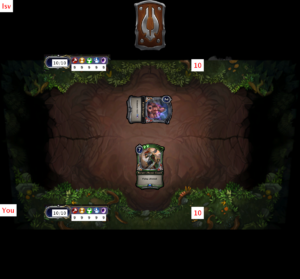
I don't think anyone would block in this situation. As long as your unit lives, you should easily win the game and there is no reason to risk it. But let's dissect what's happening here. By attacking, LSV is telling us that he has a combat trick or some other way to finish off your unit. If he does and you block, you are both at parity so you now have around 50% chance of winning the game. If he doesn't have anything, you eat his Stranger. Do you feel much more ahead then you were before? Probably not, as you were winning anyway if the Rolant's Honor Guard doesn't die and LSV's unit was pretty irrelevant.
As a corollary that you should never block, LSV should always attack, as it is 2 free damage. Note that even if you knew LSV would bluff in this situation, you shouldn't block, as the cost of being wrong is so much larger than being right that it is not worth the gamble.
What if we were at just 6 life? Should we block? In this case, we are almost forced to put our bomb into combat, any combat trick LSV could have that would take down our unit would also kill us. In this situation, our life is more valuable than our unit. Hence, the conclusion is the opposite: LSV should never bluff.
Now, back at a good life total, let's downgrade the flier to a Fourth Tree Elder. Do you still block, or does your stance change?
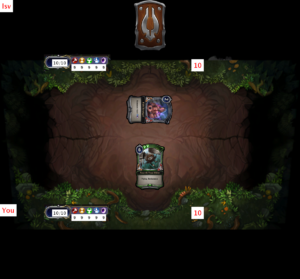
You still shouldn't block: you are winning the race and any unit you draw can already block the stranger. LSV's attack pause will also tell you if he has a fast spell or not, and you can make a better-informed decision next turn. Things may not be as clear cut though since the Honor Guard was way more dominating to the race.
What if we were talking about a 3/3 flier, for example, a Nesting Avisaur? Then things are closer, some people will block and others won't. It should be quite unlikely that LSV would attack here without a combat trick.
When deciding to block or not we basically ask ourselves: 'do I value my life more than the unit I would be blocking with plus an opponent’s combat trick?'. The better our unit is, the more likely we are to take the damage. On the other hand, if our unit is disposable or worth as much as the trick our opponent will be using, we will be more inclined to block.
Now that we have looked at the decision process of the person deciding to block, we can move on to the other side of the board as the attacker. When deciding to bluff we should run this same analysis through our opponent's eyes. How disposable is his unit? How much should he value his life total? Does it seem that the game unravels in a positive way for him even if he takes the damage this turn? Whenever we feel that there is a huge imbalance between how the opponent values his life and his unit we should consider bluffing.
Additionally, we should take into account how much the attack benefits us? Even for the 3/3 flier case, where it is very unclear if our opponent will block, if that 2 damage will turn a fast race (with whatever we are following up with) that we were bound to lose into one that we could win or trigger Spark on a key unit we just drew, then we should be more inclined to take this risk. You shouldn’t bluff just for the sake of bluffing, as there is an intrinsic risk to it and it is better to keep it to situations where you are both confident that it will go through and that there is a chance its success will have a relevant impact on how the game will play out.
There are a few things that will affect when people will be willing to call the bluff or not:
- If your opponent is tapped out but has a combat trick in hand that you know of, they are more likely to wait for the next turn to block and blow you out.
- If you showed a pause to your opponent on the previous turns, they will have a stronger belief that you have a combat trick and be more cautious about putting their good creatures in danger.
- Players will seldom block with units that can just take over the game by themselves (Siraf, Crownwatch Quartermaster, Memory Dredger, Tinker Dronedropper).
- Only bluff when there is a combat trick (or profitable follow-up play) that matches your bluff. If you are on mono-Primal, for example, there are no playable combat tricks and I would almost always block your unit.
- Never bluff if the value of the combat trick you are playing is similar to the value of the unit your opponent would be putting at risk.
- Never bluff if your opponent seems to have a counter trick, in these cases he is heavily incentivised to block and 2-for-1 you.
Moves Like Jagger
After I decided to write this article, I started saving some situations where I bluffed. The idea was to give a broader feel for what good bluffing scenarios are and discuss why I felt that it was the right play. I'm sure not everyone will agree with those, but that's the nature of these types of plays.
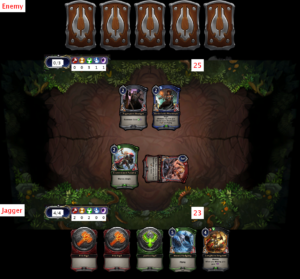
In the first case, my opponent just suited up his Aegis soon to be Flying unit giving it +2/+2. Clearly, this creature will almost be impossible to kill, especially for Rakano, in which the removal is both conditional and scarce, while combat tricks are plentiful. At the same time, it is disastrous for my opponent to have their unit lost to a combat trick, as it would be losing both in mana and number of cards for that exchange. The 3 free damage didn’t end up helping me in the end, as my opponent’s board dominated mine too well anyway, but this isn’t something you can know beforehand and the level of confidence I had here was super high.
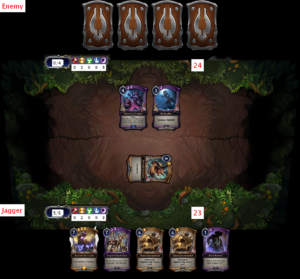
Memory Dredger is one of the scariest cards to see on the other side of the table and it can get infinite value and presents a relevant clock on the air. You need a really big incentive to put it on the line, not just because it is a bomb, but also because it can create infinite chump blockers, which achieves the same thing as blocking right now. This game went on for a while, ending in a race which was won due to this attack.
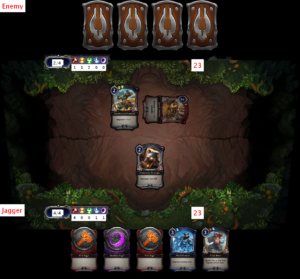
Good Awakened Student scenarios appear quite often. The card is a common, can be played early and threatens to take over the game in the long run. Quite often you are happy to 2-for-1 yourself to get rid of one. Conversely, it is worth more than 2 cards for your opponent. Here , Spark is an extra incentive to run the bluff and given my hand and game plan, having a 5/3 was infinitely better than a 3/3. This game ended a few turns later, mostly on the back of having the sparked big attacker paired with Flash Freeze. Personally, I think this is the best case, as the bluff enabled a winning strategy for this game.
Even though they all ended up working in their respective moments, I could see my reasoning being wrong, so let me know your opinions. So far, an overwhelming majority of my bluffs have gone through, which actually means I should be doing it more frequently than I actually do. If a tennis player never misses their serves it means he is not pushing the limits enough.
A couple of interesting Camat0's bluffs were caught by the VAR in a recent tournament:
This is a great play! Memory Dredger is worth so much for Mouche right here that there is no way he would risk it to take one less damage. Note that the void contains a Tranquil Scholar with Killer. There is a small touch here that both of these players know each other well and the decklists were available. Camat0 knows that Mouche is a thoughtful player and would make the correct play of not blocking.
This is a trickier case. Just like in the previous scenario, Camat0 isn't in a great spot and (I assume) feels like things really need to go right for him to win. His attack here can be seen representing one of two fast spells: Finest Hour or Stand Together. For the first one, Flash will be trading his Valkyrie Enforcer with Finest Hour if he blocks. For the latter, he would trade his unit for both Stand Together and Awakened Student. I don't think any of these exchanges are terrible for Flash, but both of these players probably consider ground units (on the TJP side) to be almost irrelevant in this matchup. Personally, I would be more inclined to just attack with Kothon which represents (with Stand Together) a better exchange, but I'm not the World Champion (yet).
Getting Started
Bluffing takes a lot of confidence, it is always awkward and you never feel 100% comfortable doing it. If you just fire a draft now and try to bluff a few times the odds are that it will end in disaster. Good scenarios with good rewards happen very infrequently. In Mouche's words, "it is an opportunistic move, as such, it should be used sparingly when the situation really feels perfect" (or something like that). Below I list some steps to train yourself to learn how to bluff and identify the correct scenarios:
The first step towards bluffing are free attacks. Those are attacks for which your unit will just bounce off the opponents unit and nothing really happens (like a 2/2 vs 1/5). It is good technical play to do them, you may know that you don’t have any combat trick, but your opponent doesn’t. Sometimes he will take the damage and sometimes he will block. This allows you to get a feel for the cases where your opponent is willing to risk their unit in combat and the ones that he isn’t.
The second step is to emulate bluff attacks when you actually have the trick. In these cases, before attacking try to predict if your opponent will block or not. Sometimes you have the trick and you really hope your opponent will block with their bomb, but deep down you know he won’t. Also, don’t try to group your predictions into block/no block. Some cases are uncertain and all that matters is being confident when they won’t block as that are the situations you should be bluffing.
Then you should start pushing yourself to be aware of bluffing opportunities. You don’t really need to pull the trigger, but try to catch situations where you believe it would work. Most of the time we just pass the turn realising there are no profitable attacks, so you actually need to develop this awareness. Then you can start bluffing. Since it is a high-risk situation, save your first attempts to hopeless situations when you are in a bad position and your unit is of no value in the game.
Getting Caught
One of the problems with bluffing is that at some point it will be called and you will lose your unit for nothing, feel bad, shame concede and swear to never try it again. Losing trying something different somehow feels worse than losing following the default script, but this sentiment will only prevent you from being a better player. Like anything else in card games, you should just look for the highest EV plays and accept that sometimes things don’t come out the way you wanted and some other times there really just wasn’t anything you could do anyway. Personally, I find it exciting the idea that the highest level of play requires taking gambits and goes beyond just “safe standard technical play”.
Final Words
This whole article was about bluffing and now it may seem like this is a really important thing to being good at Eternal. It isn’t. Good strategy and deck building are what actually matter and define good players. If you feel like you are well developed in those aspects, then you can start looking at bluffing as a tool that you may use every once in a while but don’t feel like it is a necessary skill to get to the top levels of the game. Maybe I haven't expressed it directly: the main lesson from this article is that bluffing is not about outsmarting your opponent into making a wrong play, but finding the situations where the right play for your opponent is to let the bluff pass.
I am not the best bluffer in the world and there were far more accomplished and experienced card game players than me discussing this subject. If you understand Magic, want to learn more and see a different perspective on bluffs, LSV made a great podcast about it LR - bluffing and PV also touched on the subject here.

Pingback: Lessons from Poker: Applying Game Theory Optimal and Exploitative Play to Eternal – Eternal Gauntlet